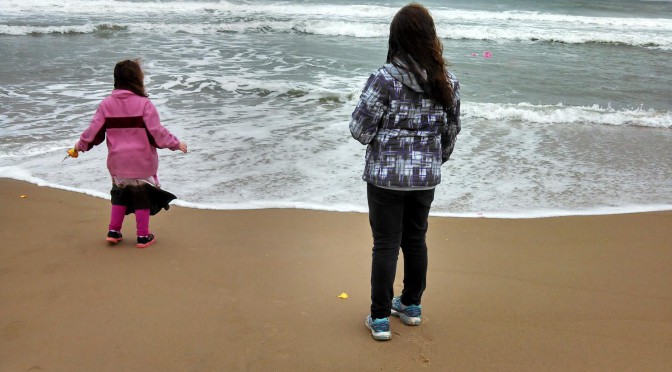Parenting can be a daunting and intimidating experience. As one of life’s major transitions, it is a time when each parent moves from being fully responsible for his- or herself to a place where you are suddenly blessed with an infant who is completely dependent upon you. Often once we feel we finally have a grasp on the daily activities of caring for our firstborn, some of us find that we are suddenly preparing for a second child. Fear, terror, joy and pure bliss may be part of the feelings we have as we imagine what the household will look like with two or more children running around.
Lisa Feiertag, API Leader, lives in the USA with her two children. She serves as an API Leader Applicant Liaison for Attachment Parenting International (API). She is also among API’s resource providers on co-parenting support for single and divorced parents.
A few questions may come to mind:
- How will I manage to get through the day with a baby and a toddler in my arms?
- I love my relationship with my first baby, and I am worried about that changing. Can I love them both fully and unconditionally?
- What about sibling rivalry or all the conflicts that may arise?
- Will they like one another, or am I going to constantly be the mediator as they get older?
Many of these questions can be answered by more experienced parents, like-minded friends or well-intentioned family members, but it may not be until the moment each concern manifests in reality that a parent understands the answer that best fits within that specific family unit.
Parents of multiple children are often concerned about conflicts that may arise between siblings as well as more intense issues of rivalry. In my personal experience, I have found that forming attached bonds with each of my children from a very young age helped to lessen the amount of arguments that may have developed between my daughters. In fact, I have found that there is little competition between my girls, and I credit Attachment Parenting as one of the main reason this does not happen.
Attachment Parenting seeks to meet the needs of each person while encouraging respect and empathy as a lifelong skill. When we are able to practice this with each child we are building personal empowerment instead of creating issues that might lead to competition.
Learn more about Attachment Parenting on API’s website and through API’s Eight Principles of Parenting
From the beginning, an emphasis was placed on meeting everyone’s needs within my household. This meant that each of us valued the importance of listening and communicating in an open and respectful manner with one another as high on our action list. When one person felt misunderstood or ignored, it was encouraged that this be communicated — in a developmentally appropriate way — so that we could try to determine the unmet need and help to reframe a situation so that a positive outcome could occur. As a result, each person is seen, heard and fully supported while the individual needs are met — which minimized the desire to want to create conflict with someone else.
Learn more about API’s Third Principle of Parenting: Respond with Sensitivity
I quickly realized that I would need to cultivate my awareness around patience in such a way where I could immediately recognize when a break might be desired in order to take the time needed to be with intense feelings. My daughters know how to identify their feelings and voice when they need space or a break away from high-stimulating experiences or strong emotions.
Allowing the freedom and flexibility for each person to find an area within the home as a safe place to go and be alone in order to work through heavy emotions is imperative for us. This has to be honored by all family members, which helps to keep conflicts to a minimum. Sometimes having a few moments of silence can be the most valuable option in a household of many different people and personalities. This break away from others can help to strengthen the child’s intuition and ability to listen to what the body needs. Steps can then be taken to meet those unmet needs.
Positive discipline is a huge help in keeping healthy relationships between all family members. Creating a “yes” environment within the home encourages children to explore their own options, limits and boundaries in order to foster self-responsibility. Our home is our sanctuary where we each know that things can be changed when something is no longer working in meeting our individual and collective needs. My daughters and I constantly check in with one another and work on finding healthy solutions to issues in a collaborative way so that everyone is part of the process.
Learn more about API’s Seventh Principle of Parenting: Practice Positive Discipline
Another way rivalry and conflicts are minimized amongst my daughters is to make sure that they both feel loved and held. I find that using nurturing touch is an amazing way to transform any intense issue that comes up. It is truly amazing how fast a hug or a pat on the back can redirect any negative feeling. It is important to allow this time for each child. I make sure that I have individual time with each of my daughters in order to allow for undivided attention and openness to snuggle, embrace or just communicate with one another without interruption.
As they are growing older, I find that practicing nurturing touch is the one of the most valuable aspects of Attachment Parenting and keeping a solid connection. For me, it is imperative to find a way to incorporate nurturing touch even as my oldest is moving into an age where she may seem untouchable. I want her to know that I am always available for a hug.
Learn about API’s Fourth Principle of Parenting: Use Nurturing Touch
All of the above has helped to create warm connections, and this is obvious when I witness my daughters interacting with one another. Using an Attachment Parenting allows them both to fully express themselves in a non-competitive way, which empowers them to open up to what they want and need. My children are able to communicate when they need space or are overwhelmed, as well as share how much they admire and love each other. They feel secure, confident and supported, and if they do not at times, then we have the steps in place to address why and make any necessary changes. Attachment Parenting is the glue that keeps our family working together.


